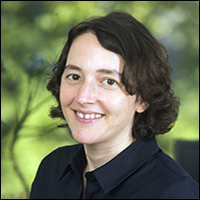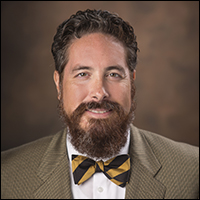Two Vanderbilt engineering faculty members–Sharon Weiss and Michael King–have been elected as 2021 Fellows of the American Association for the Advancement of Science, the world’s largest general scientific society.
The lifetime appointment honors individuals for their efforts in advancing science applications that are deemed scientifically or socially distinguished. Election as an AAAS Fellow is an honor bestowed upon association members by their peers. Fellows receive a certificate and a ceremonial pin. The new fellows will be celebrated Feb. 19 at the association’s Annual Meeting, which is convening in a hybrid format in Philadelphia, Pennsylvania, and online.
Weiss and King join five Vanderbilt University and Vanderbilt University Medical Center faculty members who have been elected 2021 fellows.
Weiss, a Cornelius Vanderbilt Professor of Engineering and director of the Vanderbilt Institute of Nanoscale Science and Engineering, is honored for “distinguished contributions to the field of silicon photonics, particularly for guided wave optical biosensors and novel approaches to tailor light-matter interactions.”
King, the J. Lawrence Wilson Professor of Engineering and chair of the Department of Biomedical Engineering, is honored for “distinguished contributions to the fields of biotransport phenomena, cellular mechanotransduction, and nanoparticle drug delivery, particularly to understand the behavior of blood and cancer cells in the circulation.”

Weiss is recognized internationally for her contributions to the understanding of how guided waves and biomolecular species interact in a porous medium from both the fundamental optics perspective and from the mass-transport perspective. “Sharon is one of the most accomplished electrical engineering academicians of her generation. She is the leading expert in designing and demonstrating sensitive porous-silicon guided-wave optical biosensors,” said Philippe Fauchet, Bruce and Bridgitt Evans Dean of Engineering at Vanderbilt University.
Weiss, a professor of electrical engineering, material science and engineering, and of physics, also is a pioneer in identifying novel approaches to increase electric field localization in silicon photonic structures, which has impact across a broad range of applications including optical biosensors, optical modulators, lasers, and quantum information systems.
Weiss and colleague Richard Haglund, Stevenson Professor of Physics, are the first to demonstrate that it may be possible to achieve data rates exceeding one terabit per second on a single channel. They created a hybrid silicon chip by including a small amount of vanadium dioxide—an ultrafast‐switching phase‐change material—to extend the capabilities of silicon photonics. This means future computers may be able to run faster and with less power than current computers, by using light.
Among her distinctions for research achievements include a National Science Foundation CAREER award, an Army Research Office Young Investigator Program award, and a Presidential Early Career Award for Scientists and Engineers. Weiss is a Fellow of SPIE, the International Society for Optics and Photonics, and of Optica, formerly known as The Optical Society (OSA).

King, who holds a joint appointment in radiology and radiological sciences, is an internationally renowned researcher and scholar. He works at the interface among cellular engineering, drug delivery and nanotechnology. King employs tools and concepts from engineering to understand biomedically important processes that occur in the complex flow environment of the bloodstream, including cancer metastasis, inflammation and thrombosis.
King has pioneered the use of proteins to deliver death signals to tumor cells in flowing blood, and to deliver therapeutic cargo, such as siRNA chemotherapeutics, encapsulated in nanoscale liposomes. The King lab is testing these novel cancer therapies in models of metastatic breast and prostate cancer using whole body bioluminescence and ultrasound imaging.
“Mike King is a world leader in the fields of biotransport phenomena and cellular mechanotransduction. And, [he] is one of the most brilliant individuals I have had the pleasure to know in my professional career,” said Richard Waugh, professor, former chair of biomedical engineering, and former Vice Provost for Research at the University of Rochester.
King is co-inventor of Multiparticle Adhesive Dynamics (MAD), a many-particle-based simulation method that correctly predicts cell rolling and adhesion on the surface of blood vessels and medical devices, which has inspired similar efforts around the world. He also has co-written two successful textbooks and edited several research monographs. King is editor-in-chief of Cellular and Molecular Bioengineering, a journal of the Biomedical Engineering Society.
Among King’s achievements are a National Science Foundation CAREER Award, a James D. Watson Investigator Award, a Whitaker Foundation Whitaker Investigator, and a number of teaching awards. He is a Fellow of the American Institute for Medical and Biological Engineering, and the Biomedical Engineering Society.
The AAAS includes more than 250 affiliated societies and academies of science, serves 10 million individuals, and publishes the journal Science. It was founded in 1848 and its tradition of naming AAAS Fellows began in 1874.
Contact: Brenda Ellis, 615 343-6314
brenda.ellis@vanderbilt.edu